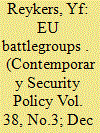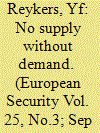| Srl | Item |
| 1 |
ID:
156091


|
|
|
|
|
| Summary/Abstract |
This article reviews the gloomy saga of the EU Battlegroups, focusing on four questions: Where do they come from? What do they look like? What have they been hindered by? And where do they go from here? It builds upon earlier findings in the literature and adds novel insights based on original data. In doing so, the article pays particular attention to the standby nations’ constant calculation of political and financial costs. It argues that recognizing these cost–benefit calculations allows for identifying the most crucial areas to be tackled to make the EU Battlegroups functional. In addition, the article stresses that these considerations play out in a setting wherein the Battlegroups are just one among many policy instruments available for rapid response.
|
|
|
|
|
|
|
|
|
|
|
|
|
|
|
|
| 2 |
ID:
156088


|
|
|
|
|
| Summary/Abstract |
Military rapid response mechanisms are generally understood as troops that are on standby, ready to be deployed to a crisis within a short time frame. Yet, the overall track record of the existing multinational rapid response mechanisms within the European Union, the African Union, and North Atlantic Treaty Organization remains disappointing, and the United Nations does not even have a rapidly deployable capacity anymore. Meanwhile, despite that calls for the further development of these mechanisms are still being voiced politically, scholarly literature remains fragmented. This is problematic as many of the obstacles faced by these organizations are similar. This forum uniquely compares experiences from the four aforementioned organizations. Drawing on these insights, this introductory article identifies some key factors that hamper or enable the development and deployment of multinational rapid response mechanisms.
|
|
|
|
|
|
|
|
|
|
|
|
|
|
|
|
| 3 |
ID:
146998


|
|
|
|
|
| Summary/Abstract |
Although the sad track record of the EU Battlegroups has attracted considerable scholarly attention, analyses have largely focused on obstacles related to the provision of the Battlegroup troops and to the consensus within the EU Council, hence taking a supply-side perspective. This article calls for complementing this perspective with an analysis of the demand for their deployment. That implies analysing whether and why the EU Battlegroups were (not) considered as an option by those actors taking the initiative to intervene in a particular crisis. Applying a rational-institutionalist approach, this article explains the absence of the Battlegroups from three recent crises: Libya (2011), Mali (2013) and the Central African Republic (2013–2014). Using data from document analysis and elite interviews, it shows that once a rapid military reaction became urgent, the EU Battlegroups were not even considered as an option by those initiating an international reaction.
|
|
|
|
|
|
|
|
|
|
|
|
|
|
|
|